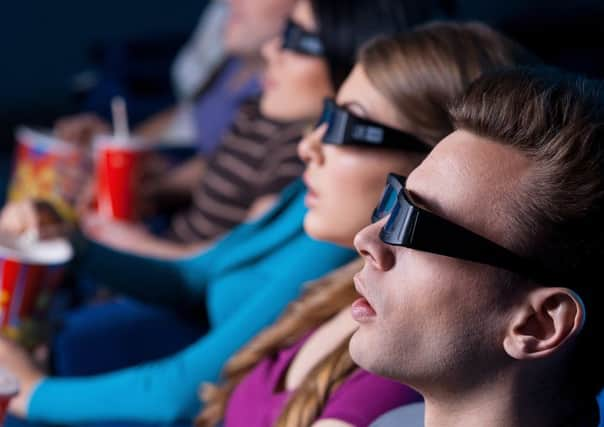Aidan Smith: Don't blame Netflix, a lack of nerve is killing the cinema


The flicks, the pictures, the movies - when was your last time? Maybe yesterday, a last-day-of-the-school-hols treat for the kids, but I’m talking about a proper, grown-up cinematic experience where the drama is entirely centred round the film, not in how much that small sack of Pick ’n’ Mix is going to cost after it’s very nearly broken the food-vendor’s scales.
I honestly can’t remember my last time. After On the Buses, the big-screen version, this cineaste’s CV is just a blur. OK, I exaggerate for comic effect, and if you had the misfortune to witness Reg Varney blown up to 50ft in your local Regal you’ll acknowledge that was quite a good gag, certainly no worse than any in the film - but my last time was a long time ago. If I have a spare hour and three-quarters now, I’ll try and find something on Netflix.
Advertisement
Hide AdIn so doing, apparently, I’m killing films. Throttling the movie-going experience to death. Those diabolical streaming services, and our dull devotion to them, are ruining the once-great institution of a picture-house full of folk all chuckling and gasping in unison, drunk on Kia-Ora and communality.
Who says so? Dame Helen Mirren, no less. According to one report, she argues that the Netflix effect has hit hardest among those movie-makers “who create films with an audience in mind”. I would have thought that was all movie-makers but this noble breed definitely includes Mr Helen Mirren, the director Taylor Hackford.
“It’s devastating for the likes of my husband,” she says of the home viewing craze, “because they want their movies to be watched in a cinema. It should be a communal thing, an audience, a movie and you’re all in it together. You’re frightened, you laugh and you cry together. But it’s beginning to disappear.”
Ah Helen. I’ve delved into her celluloid oeuvre from time to time. The first was Hussy early in her great career in which she played a prostitute. Myself and three chums were sufficiently intrigued by the tagline “How much sex is enough?”, but no one else was. The four of us didn’t seem to constitute a quorum in the Classic, Edinburgh’s favourite racy-movie flea-pit. When someone, usually Dame Helen, disrobed on screen we just got more and more nakedly self-conscious. The elderly usherettes in their horn-rims seemed to be staring straight at us. Our earlier cockiness had shrivelled and we would have happily had the projectionist abandon the showing. Communal feeling wasn’t much in evidence that day.
Then there was Caligula. La Mirren was in that, too, along with numerous big beasts of the Shakespearean stage who earnestly believed that serious-masterpiece status was a given for this biopic of the mad Roman emperor who was in love with his sister and made his horse second-in-command. The top-grade thesps were appalled when they viewed the finished work, bulging with bare, undulating flesh. But with the world’s second-most-famous porn magnate producing, what did they really expect? In the cheap seats, meanwhile, my gang of four were laughing and crying, though not always at the appropriate moments.
I’m sure Dame Helen isn’t thinking of Caligula when she harks back to a golden age of cinema and cinema-going but right now there are films which do more harm to cinema than Netflix. These are the play-safe films which, come to think of it, lack the bonkers bonking boldness of Caligula. There are the copycat films which rip off key scenes, plot twists or group singalongs from proven successes.
Advertisement
Hide AdThen there are the lumpen blockbusters, the films of the comic-book tyranny and those franchise movies which assume seats have been purchased in perpetuity. Don’t forget the youth-demographic films which flood the multiplexes, movie studios having apparently given up on the older generation, forgetting that like many things, cinema is wasted on the young.
And there are the films which gaze forlornly at TV, where the best writing talent currently resides, and at the one-time movie stars who’ve been lured onto the small screen. Honestly, there are so many of them in telly right now and they’re having so much fun that the analogy which comes most readily to mind is of a bevy of Penthouse centrefolds invited to the re-staging of a bathhouse orgy from 2,000 years ago.
Advertisement
Hide AdThe lack of ideas, and of nerve, afflicting cinema is not something that directly concerns Dame Helen. She hasn’t had to play hookers with one functioning stiletto heel for a while now and doesn’t have to perform for four nervously tittering fools with bumfluff moustaches smeared in boot polish to try and make them look older.
But when she says she prefers to watch films in a “beautiful cinema”, you wonder where this pleasuredome might be located. Cinemas these days may have throne-style seats fit for, yes, Roman emperors but in all other regards they’ve lost their grandeur.
And who wants to be able to perch like an emperor if you can’t deal with noisy patrons eating smelly food as a toga-ed tyrant might by throwing them to the lions? All of this is detrimental to the cinema experience; Dame Helen can’t just blame Netflix. Some of the mystique of movies has gone. That used to be intensified by the provinces - ie the whole of Scotland - having staggered release dates.
I well remember the interminable wait for Jaws, which whipped up the anticipation some more. And I’ve often wondered: did the shark terror classic reach Stonehaven’s Picture House before it closed? Or does “We’re gonna need a bigger boat” remain simply the old fishing port’s time-honoured response to a sudden upsurge in the local podley population?
Communal feeling? We don’t seem to need it anymore, whether in pubs, shops or cinemas. We’ve made our bed and we must lie on it, watching Netflix.